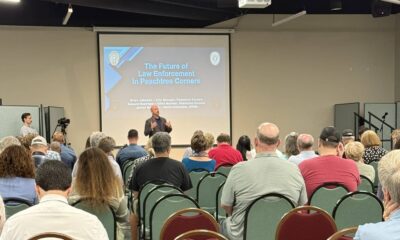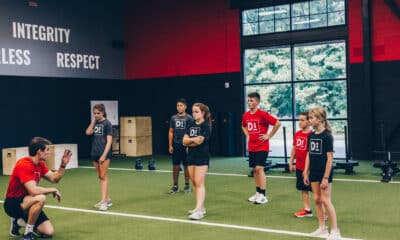City Government
Peachtree Corners Distinctiveness Predates Cityhood
Published
3 years agoon
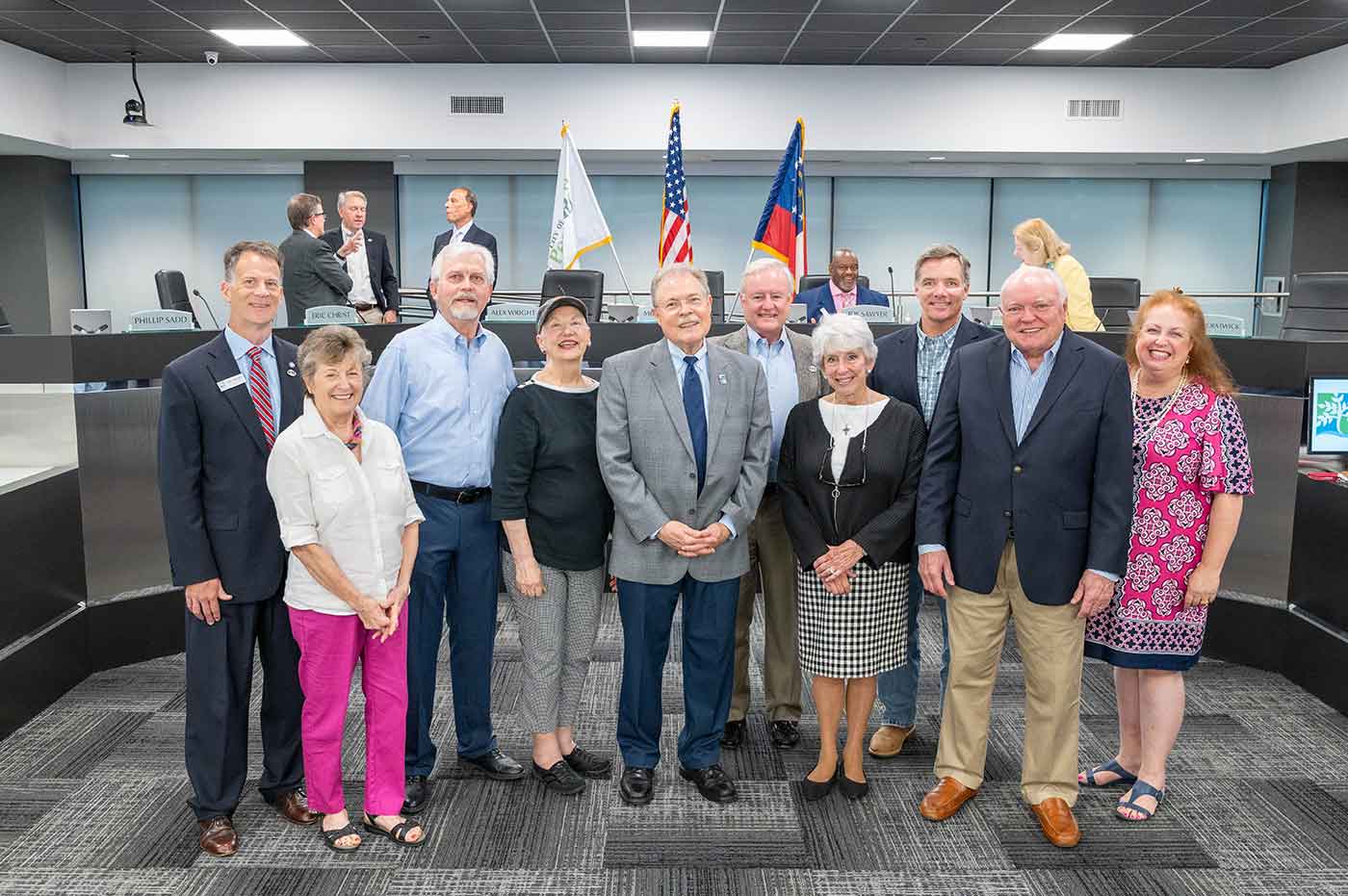
The wild, wooly wilderness of western Gwinnett holds a richness that has drawn many to settle on these banks of the Chattahoochee River to this day.
In its 10 years as a city, Peachtree Corners has built a reputation as an innovative center for technology and a community that strives to maintain family values and a quality way of life. To get a perspective on why this city is a jewel in the crown of Gwinnett County, it’s important to go back to the origins of how this area became settled.
Atlanta native Carole Townsend wrote a book, released last year, about the history of the area. Titled “Peachtree Corners, the History of an Innovative and Remarkable City 1777-2020,” she chronicles the city from the early days of the Creek Indians, who claimed the area as their home, through the creation of the technology hub that exists today.
In a podcast interview with Peachtree Corners Magazine shortly after the book was published, Townsend gave insight into why Peachtree Corners is such an innovative and remarkable place.
The boundary that defines the westernmost part of Gwinnett County, the Chattahoochee River, was perhaps the main reason the area was so coveted by many. For the indigenous peoples, it was a lifeblood, explained Townsend. And as Europeans moved into the area, they naturally built their settlements along it.
“The Europeans brought with them diseases that the Native Americans had no immunities to,” said Townsend. “A lot of them were wiped out.”
Eventually about 16 different native tribes formed a nation of Native Americans that was mainly made up of Creek with a little Cherokee mixed in.
“The Cherokee tribes were mainly north of the Chattahoochee,” said Townsend.
By the time the colonies had formed to become American, there were few Indigenous people left. That’s when many of the founding families moved to this area.
“When we look at Holcomb Bridge Road and we look at Nesbitt Ferry… these are not names just pulled out of a hat. We even have recent history that they go back a long way,” she continued.
In 1777, western Gwinnett County, in what is now Peachtree Corners, had its first White landowners. “I can tell you the absolute earliest family was the Medlocks. And I can say that with certainty because Isham Medlock was the first recorded Medlock in the area,” Townsend added.
Another prominent family that Townsend chose to highlight, the Nesbitts, wasn’t of European descent.
“Of course, there are many important families that settled the area, but the Nesbitt family — the Perry Nesbitt family — struck me as another group that really needed to be part of the story,” said Townsend. “The patriarch and the matriarch of that family were born into slavery. They were born before the Civil War ended, and in fact, the grand patriarch — they actually called the gentleman Perry P. Nesbitt — was also born into slavery and was emancipated at age nine; he became a prominent landowner in Pinckneyville and that was highly unusual.”
In that period of the nation’s history, it was very unusual for someone of color – especially someone who had been born into slavery — to become a well-known and prominent landowner. “That was done strictly through work ethic and a love of education and that it was a story that had to be told,” added Townsend.
Fast forward to the mid-1900s, and Gwinnett County hadn’t changed much from its early days. To the people in Fulton and DeKalb counties, Gwinnett was pretty much the wild and wooly wilderness. There wasn’t much development, but there was a lot of trade with the railroad coming through Norcross.
Attracting best, brightest minds
You really can’t document Peachtree Corners history without mentioning Paul Duke. After graduating from the Georgia Institute of Technology, he worked for
L.B. Foster, a railroad equipment manufacturer.
In the late 1960s, he pitched an idea for a planned community in the area known as Pinckneyville, now Peachtree Corners. He had the vision for a place where people could live and work in the same area to eliminate long commutes. In essence, he designed one of the first live-work developments.
Duke was concerned that Georgia Tech grads basically had their bags packed before graduation and headed to places outside the state. This “brain drain” was taking away the best Georgia-grown intelligence to help other areas prosper.
“Part of his job with [Foster] was to acquire properties on which to build their facilities. And as a result of those responsibilities, he ended up in western Gwinnett County and he immediately dubbed it ‘God’s country.’ He thought it was the most beautiful place he had ever seen,” Townsend said. “That’s when he got the idea to build this cutting-edge technology campus or business campus with a focus on technology to attract those engineers.”
Duke developed the business area called Technology Park which brought high-tech industries into the area. In the mid-1970s, another developer, Jim Cowart, built upon Duke’s idea with the neighborhoods of Peachtree Station, River Station and others. In the 30-plus years since the vision of Peachtree Corners, the population has skyrocketed with an estimated current total of nearly 50,000.
Protecting the quality of life
Although Technology Park has a lot to do with Peachtree Corners success and growth, the uniqueness of the city is so much more than that.
With the seven-mile northwestern boundary of the Chattahoochee River, Peachtree Corners residents have an abundance of natural beauty within their sight. The 277-acre Simpsonwood Park is a heavily wooded area along the Chattahoochee. In 2016, Gwinnett County developed a $7 million plan to upgrade the area. It added a learning playground, nature overlooks, trail improvements and camping amenities.
Jones Bridge and Holcomb Bridge parks are also located along the banks of the Chattahoochee. They are parcels of natural beauty that offer playgrounds, river overlooks, fishing pavilions and open meadow space.
With so much emphasis on growth and development, the city founders believed it was important to keep in mind quality of life issues. Some of the same breathtaking scenery that first drew the Creek and Cherokee tribes, as well as the first European settlements, has survived to this day.
Maintaining that balance of progress and preservation has been a goal for the United Peachtree Corners Civic Association (UPCCA). The nonprofit, non-partisan organization serves the residents of Peachtree Corners in their desire to maintain high quality of life standards. The association monitors and communicates land use and rezonings, transportation, education, public safety and other issues of significance to the community.
It recently held a townhall meeting allowing all interested parties to learn about planned changes to The Forum at Peachtree Parkway and surrounding areas. It also held its annual COPS forum where residents learned about public safety issues in their neighborhoods, schools and all throughout the city.
“We actually predate the city,” explained UPCCA President Matt Lombardi. “It was from this organization that the question of cityhood first arose — and it wasn’t an impulsive decision. We all weighed the pros and cons of adding another layer of bureaucracy to the area.”
Peachtree Corners was a city-like area, but not quite what the Census Bureau calls a designated place —a statistical geographic entity representing a closely settled, unincorporated community that is locally recognized and identified by name.
Lombardi admitted that he wasn’t completely sold on the idea of cityhood at first. “I thought we had a good thing at the time and wasn’t sure we needed to change it,” he said. “I’d been pulled over three times in Dunwoody, which had just become a city, and was concerned that we’d become a speed trap needing the revenue to pay for police and other services.”
Lombardi said one of the selling points for forming a city was that there wouldn’t be a city police force. To this day, Peachtree Corners uses Gwinnett County law enforcement.
A city is born
As early as 1999, the notion of forming a city had been bandied about. On July 1, 2012, Peachtree Corners officially became a city, the county’s 16th — and largest — city, and the first to incorporate since 1956.
“The people have spoken,” said Mike Mason, who had led the campaign as the president of the UPCCA, in a statement to the Gwinnett Daily News. “Now, we have a voice. We can have a plan for the future.”
Gwinnett County Commissioner Lynette Howard, who represented the area at the time, said cityhood allows local residents to have more control of their own destiny. “I just love the branding and the identity, and it’s just going to strengthen,” she told Gwinnett Daily Post. “It’s so exciting. It’s not (just) a volunteer community anymore.”
Now mayor of Peachtree Corners, Mike Mason said the city is what he and other envisioned — and more. “The original purpose of the city was self-determination. We all felt that the citizens of Peachtree Corners should make decisions about our future, not the county, or anyone else. So, from a self-determination point of view, it’s been exactly what we hoped,” he said.
“What’s been better than we hoped has been the extent that self-determination has fueled innovation, creativity and flexibility. Curiosity Lab is a world class entity. No one was talking about incubators or sophisticated high tech, global economic development programs in 2011. No one knew we’d have to pivot and save the trees in Simpsonwood Park from development in our first year of existence. No one was thinking about a Town Center or multiuse trails either.
“I’ve been told many times by former county officials and citizens alike that without the city, Peachtree Corners would have a very, very different look. A look our citizens would not approve,” Mason concluded.
Lisa Proctor, president of Peachtree Corners Business Association (PCBA), a civic organization that is also celebrating a 10-year anniversary, agreed. “Celebrating milestones such as the 10-year anniversary of the City of Peachtree Corners provides the unique opportunity to take a step back and reflect on what is working and what can continue to be improved and enhanced,” she said.
“Like any new city, we are experiencing change and growing pains. Being informed and staying up to date on what is happening is a challenge when growth is happening so quickly,” Proctor added. “As a long-term resident and business owner in the city, I have the opportunity to evaluate these questions from both perspectives.
“I continue to feel strongly that in order to have effective planned growth, we need our planning and zoning to maintain the quality of our community by limiting exceptions, changes in zoning and overgrowth with too many apartments, too much traffic and overcrowding our natural resources, schools, sewers and amenities,” she said.
But Proctor stressed that she believes that Peachtree Corners is living up to its mission. “I would love to see Peachtree Corners continue to grow and evolve while maintaining a sense of community and service that reflects our values and community spirit. I think with a balance of continued input from both the residential and business community, these objectives can be met. I do believe it is important to have a community that respects its citizens throughout their life — from child to senior citizen — and a city that does not only focus on limited demographics.”
Ready to take on the future
Through her research, Townsend gained a new respect for Peachtree Corners. “My takeaway from this book is the fact that Peachtree Corners is undisputedly the crown jewel of Gwinnett County,” she said. “The American dream today is not what it was in the late 60s and 70s. Millennials — the workforce now — they don’t want the big house and the two cars in the driveway and the 2.2 kids … They want smaller, more efficient housing. They want walkability. I’m not sure a visionary as Paul Duke could have understood where technology was going by this time. So, Technology Park has been reimagined and it’s an example for the world not just for the nation.”
Mayor Mason admitted he doesn’t have a crystal ball, but he has high hopes for the city’s future. “Who knows where Curiosity Lab will go, how Intuitive Surgical will change the city or the impact of the redevelopment of The Forum? After 10 years, I am still trying to find that magic bullet to initiate redevelopment on the southside,” he said.
“What I’d like to see is a rapid bus corridor leaving Doraville Station, going down Buford Highway, then on to Jimmy Carter and Holcomb Bridge Road, turning around at the little Publix with several transit hubs along the way. I’ve been told our citizens living along that corridor would benefit from transit and this would be a real spur to redevelopment.”
Mason added, “My other dream is to have a college in Peachtree Corners. We have two high schools in our community and lots of other residents — of all ages — would benefit from educational opportunities in the city. I’m not just talking about general education, but technical programs that complement Curiosity Lab, Intuitive Surgical and our other technology-based businesses.
“The possibilities for Peachtree Corners are limitless given the innovation and creativity of our citizens.”
Related
Arlinda Smith Broady is part of the Boomerang Generation of Blacks that moved back to the South after their ancestors moved North. With approximately three decades of journalism experience (she doesn't look it), she's worked in tiny, minority-based newsrooms to major metropolitans. At every endeavor she brings professionalism, passion, pluck, and the desire to spread the news to the people.

City Government
Peachtree Corners Hosts Discussion About the Future of Local Policing
Published
2 days agoon
May 12, 2025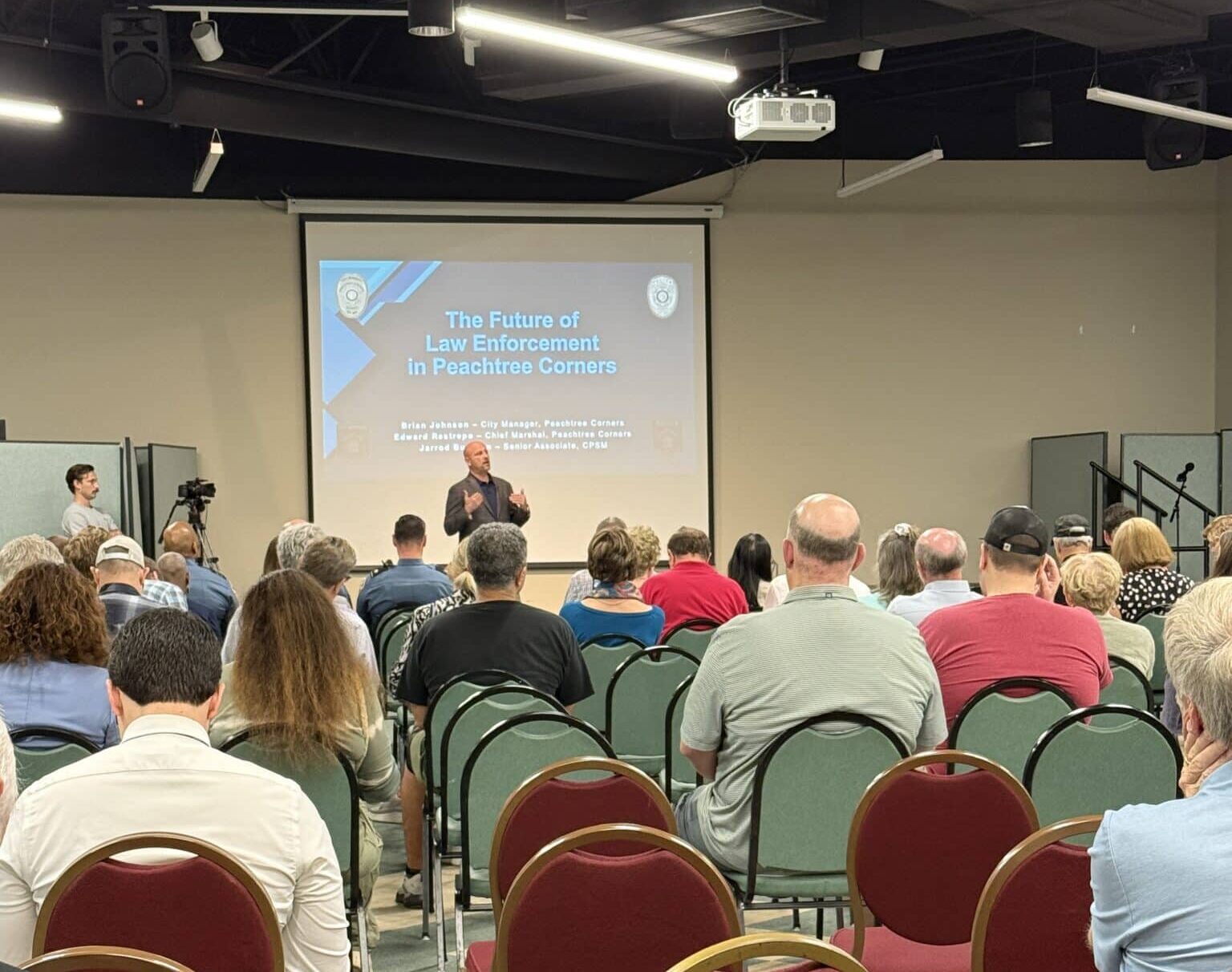
Although crime isn’t on the rise, and the Gwinnett County Police Department (GCPD) is fulfilling its role in fighting crime, the City of Peachtree Corners is asking residents, business owners and city stakeholders if they believe the city should form its own police department.
With close to 200 people in attendance, City Manager Brian Johnson led the discussion about the future of policing in Peachtree Corners. He presented the findings from a survey conducted by the Center for Public Safety Management (CPSM), a nationally-recognized law enforcement consulting and training firm, as well as information about patrol officer staffing, response times, costs to tax payers and a potential timeline.
Ensuring public safety
Johnson kicked off his presentation by explaining that it is the duty of the mayor and city council to ensure public safety, including reviewing law enforcement.
“Maybe it needs to grow, maybe it needs to change its focus. But city council is the one that has the decision-making responsibility,” he said.
He was also adamant that this isn’t a done deal.

“I hit this point already, but I want to hit it again. This is the start of a conversation, a community conversation and feedback to council. There hasn’t been a decision,” he said. “Council has not received this presentation from me. They’re here to watch and learn from your feedback of this.”
Mayor Mike Mason was present at the meeting, along with all of the city council members except Eric Christ who was out of town and watching remotely.
Issues and obstacles
Johnson explained that the grounds for the inquiry were based on issues about communication, access to information and enforcement of city-specific ordinances. He cited an example where a city rule that private residences can’t be rented on a short-term basis like Vrbo or Airbnb wasn’t enforced by GCPD. An owner tried to circumvent the ordinance by only renting the outside of the house. A loud pool party ensued, and frustrated neighbors dialed 911.
“Officers showed up and they said, ‘We can’t enforce the city’s noise ordinance,’” Johnson said.
The first stage to fix this problem was creating the marshal program to bridge the gap between code enforcement and GCPD.
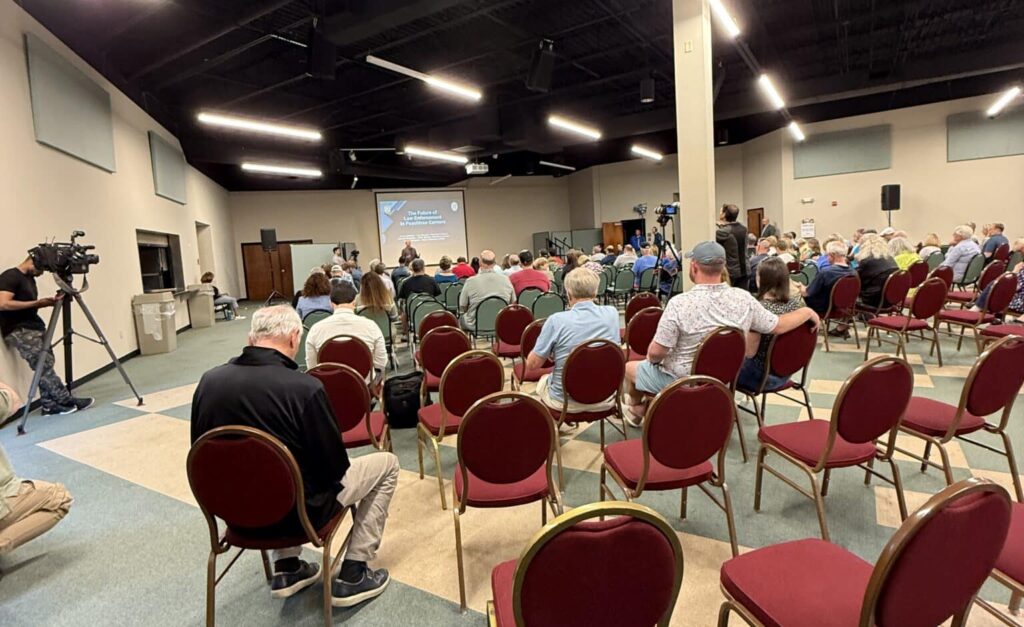
“[We thought] they would be able to enforce both local ordinance and state law, since they are a function of the city, and they could maybe be a force multiplier for Gwinnett since [marshals] don’t have to respond to 911 calls,” said Johnson.
But other issues arose shortly after the department was formed.
“We were still working towards getting that good balance, but we have been faced recently with a couple of things that make it harder for us,” said Johnson.
Seeking shared access
Instead of GCPD giving PTC marshals read-only, quick access to incident reports, dispatch calls and other information, the marshals department was required to file open records requests through the same process as any civilian.
“They were denied, as well as the city of Sugar Hill, [when] asked for the ability to see, not change, but see the computer-aided dispatch information, so that they would know where Gwinnett County police officers were; so that they could avoid stepping on their toes or maybe looking to support their efforts, and they haven’t been granted that,” said Johnson.
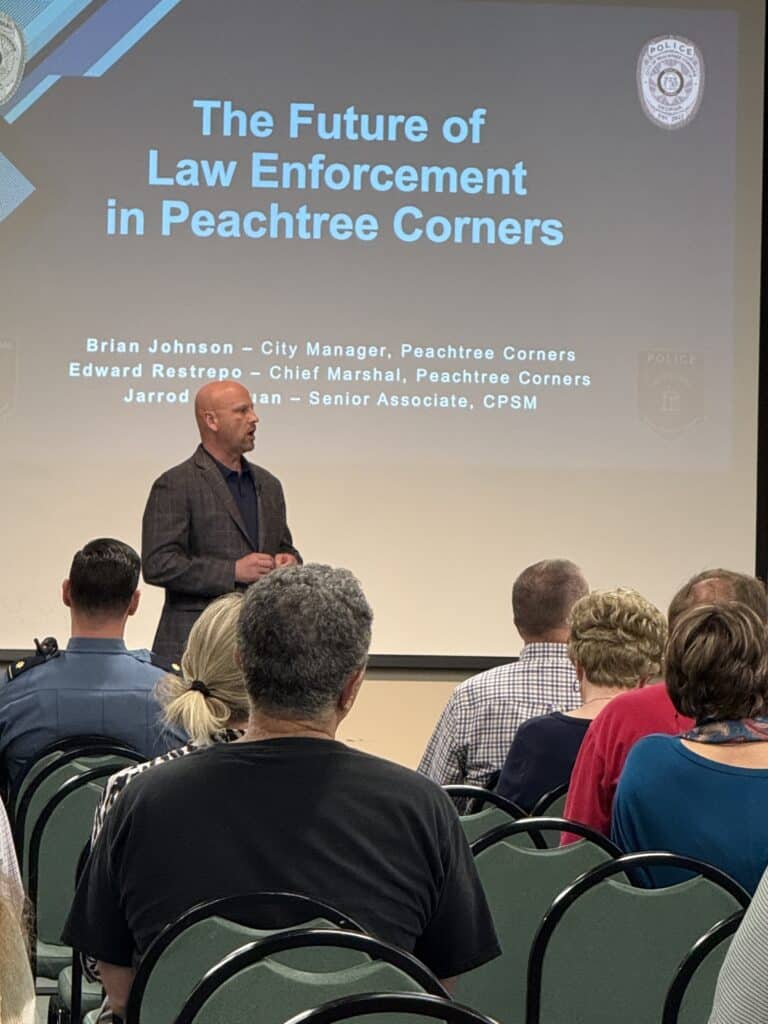
He added that the GCPD has video cameras on certain roadways that are used for various reasons, and law enforcement can use them when there’s crime in the area. Peachtree Corners marshals were denied access to those cameras.
“Conversely, we have a couple hundred cameras in the city, and we definitely want them to have access to them,” said Johnson. “So the frustration out of not being able to get that symbiosis between the marshals and police made us start thinking, all right, you know, is there another option?”
Community feedback
CPSM utilized data from GCPD to discern if Peachtree Corners could feasibly stand its own force. It also took into consideration crime trends, costs and many other factors. It recommended a 55-officer department, costing $12.1 million annually, with a $2.2 million upfront cost.
Comparing the two options to “renting vs. owning” the primary law enforcement agency in the city, Johnson presented pros and cons for each. Once the question-and-answer portion began, there was no obvious choice. Men and women, young and more advanced in age, had both similar and differing opinions.
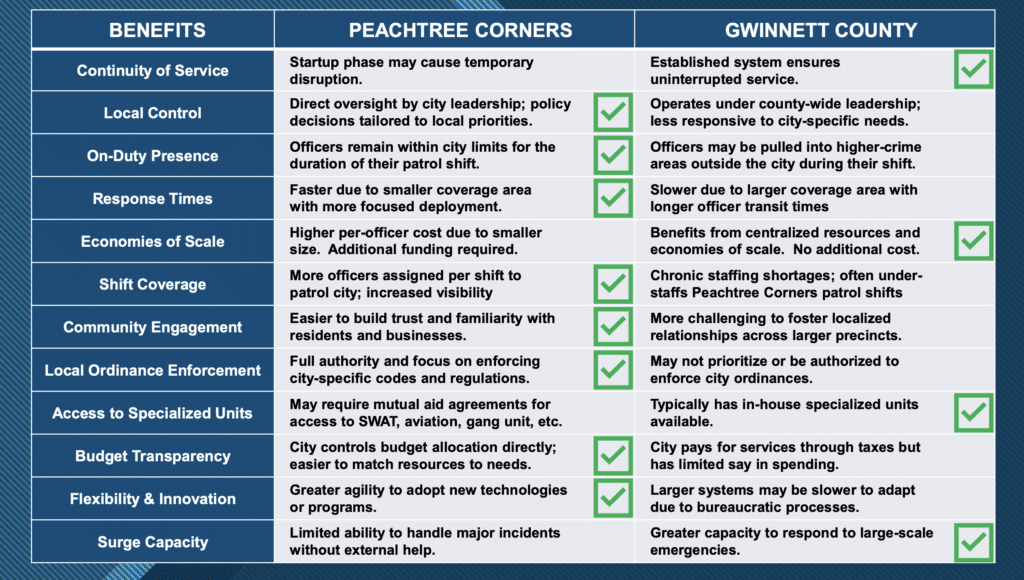
One young man, who identified himself as a local small business owner named Alexander, argued that with artificial intelligence increasing the efficiency of administrative tasks, perhaps the city wouldn’t need a full 68-man department of civilians and sworn officers.
Some accused the city of devising a solution in need of a problem. Others were concerned that paying approximately $100,00 for a study was throwing good money after bad.
But at the end of it all, the city is continuing to seek feedback and is encouraging everyone to make informed decisions. The meeting was taped and is available on the city website along with Johnson’s PowerPoint presentation, a copy of the study done by CPSM and a survey.
As far as a timeline goes, city officials would like folks to take the summer to mull it over and come back in the fall to take another look at the proposal.
Related
City Government
City of Peachtree Corners Awarded Certificate of Achievement From GFOA for Seventh Straight Year
Published
5 days agoon
May 9, 2025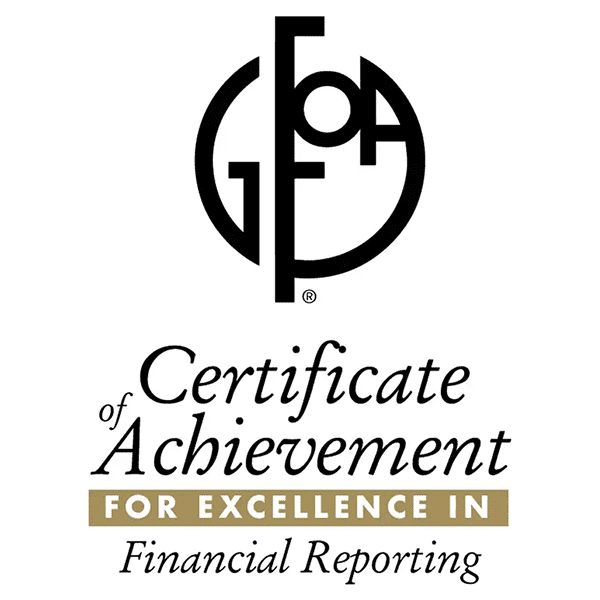
The City of Peachtree Corners’ finance department has been awarded a Certificate of Achievement for Excellence in Financial Reporting from the Government Finance Officers Association of the United States and Canada (GFOA) for its 2024 financial year-end comprehensive annual financial report (CAFR).
The GFOA’s Certificate of Achievement is the highest form of recognition in governmental accounting and financial reporting, and its attainment represents a significant accomplishment by a government and its management.
It is the city’s seventh year of receiving the award and represents a significant accomplishment by the city’s finance department and its leadership.
According to a GFOA release, “The report has been judged by an impartial panel to meet the high standards of the program, which includes demonstrating a constructive ‘spirit of full disclosure’ to clearly communicate its financial story and motivate potential users and user groups to read the report.”
“We are pleased to again receive this honor,” said City Manager Brian Johnson. “Our finance department, and Finance Director Cory Salley, are to be commended for this achievement, as it is the highest form of recognition GOFA presents.”
A comprehensive annual report
The city’s finance department produces the CAFR each year and works with independent auditors to verify the city’s financial situation and standing.
“This prestigious award affirms Peachtree Corners’ dedication to exceeding basic requirements by producing comprehensive annual financial reports that reflect a strong commitment to transparency and full disclosure,” said Assistant City Manager Brandon Branham.
About the GFOA
The Government Finance Officers Association (GFOA), founded in 1906, represents public finance officials throughout the United States and Canada.
The association’s more than 20,000 members are federal, state/provincial and local finance officials deeply involved in planning, financing and implementing thousands of governmental operations in each of their jurisdictions. GFOA’s mission is to advance excellence in public finance.
To learn more about the GFOA, visit gfoa.org.
For more about the City of Peachtree Corners, visit peachtreecornersga.gov.
Related
City Government
The Future of Law Enforcement in Peachtree Corners: Community Meeting
Published
4 weeks agoon
April 14, 2025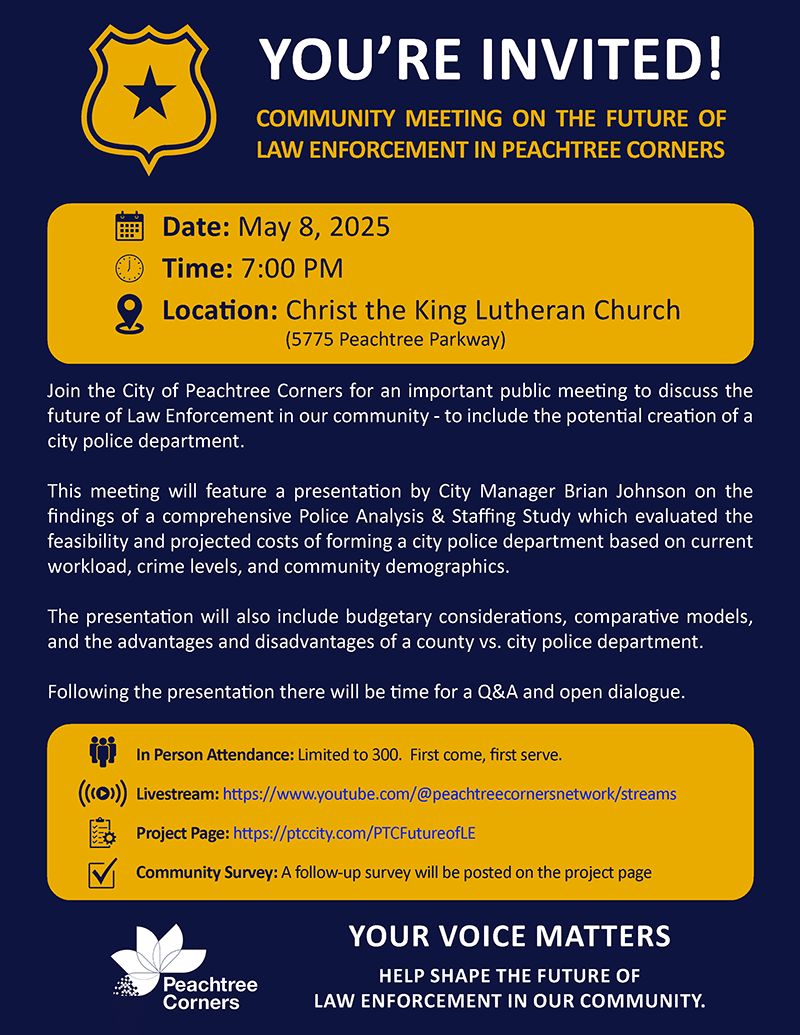
The City of Peachtree Corners will hold an important public meeting on May 8 to discuss the future of law enforcement in our community — including the potential creation of a city police department.
This meeting will feature a presentation by City Manager Brian Johnson on the findings of a comprehensive Police Analysis & Staffing Study that evaluated the feasibility and projected costs of forming a city police department based on current workload, crime levels and community demographics.
The presentation will also include budgetary considerations, comparative models and the advantages and disadvantages of a county vs. city police department.
Following the presentation, there will be time for a Q&A and open dialogue.
In-person attendance is limited to 300. First come, first served. A livestream option will be available for those who can’t attend in person.
After the meeting, a follow-up survey will be available on the city’s project page.
Meeting details
The Future of Law Enforcement in Peachtree Corners
Date/Time: May 8, 2025 at 7 p.m.
Location: Christ the King Lutheran Church (5775 Peachtree Parkway)
For more information, visit peachtreecornersga.gov.
Related
Read the Digital Edition
Subscribe
Keep Up With Peachtree Corners News
Join our mailing list to receive the latest news and updates from our team.
You have Successfully Subscribed!

Digital Edition

PCBA Announces 2025 Scholarship Winner

Official City Merchandise Line Debuts This Saturday at Town Green

Paul Duke STEM High School Student Earns CGO Scholarship

World Blood Donor Day Starts Here: Theo’s Miracle, Katherine’s Mission [Podcast]

Executive Function: A Tribute to Working Moms

Peachtree Corners Grows Business Opportunities Through Economic Development

Simpson Elementary Marks Exceptional Children’s Week

D1 Training Brings New Fitness Concept to Peachtree Corners

Peachtree Corners Hosts Discussion About the Future of Local Policing

City of Peachtree Corners Awarded Certificate of Achievement From GFOA for Seventh Straight Year

Simpson Elementary Marks Exceptional Children’s Week

Executive Function: A Tribute to Working Moms

Official City Merchandise Line Debuts This Saturday at Town Green

Peachtree Corners Grows Business Opportunities Through Economic Development

Digital Edition

Light up the Corners [Video]

Capitalist Sage: Business Leadership in Your Community [Podcast]

Cliff Bramble: A Culinary Adventure through Italy

Top 10 Brunch Places in Gwinnett County

A Hunger for Hospitality

THE CORNERS EPISODE 3 – BLAXICAN PART 1

Top 10 Indoor Things To Do This Winter

The ED Hour: What it takes to Remove Barriers from Education







